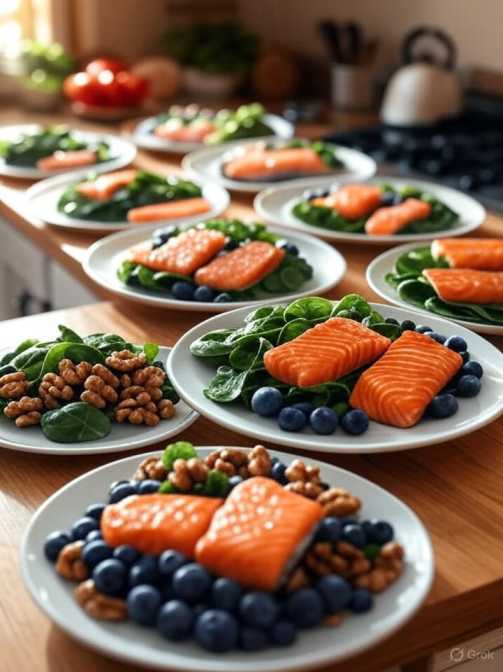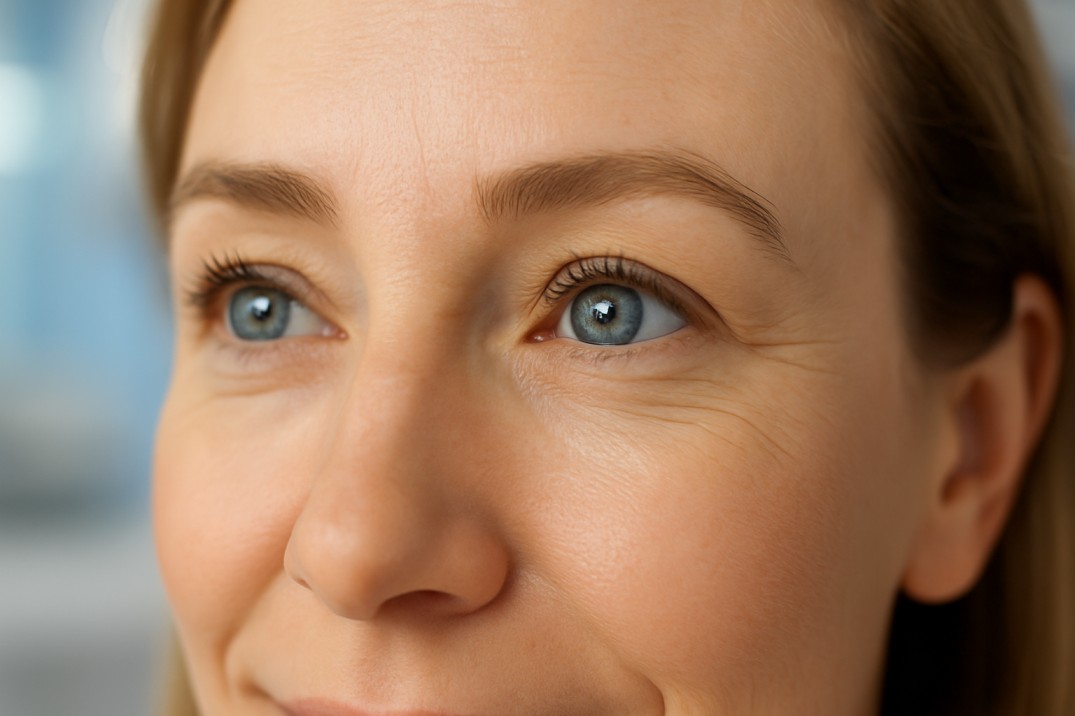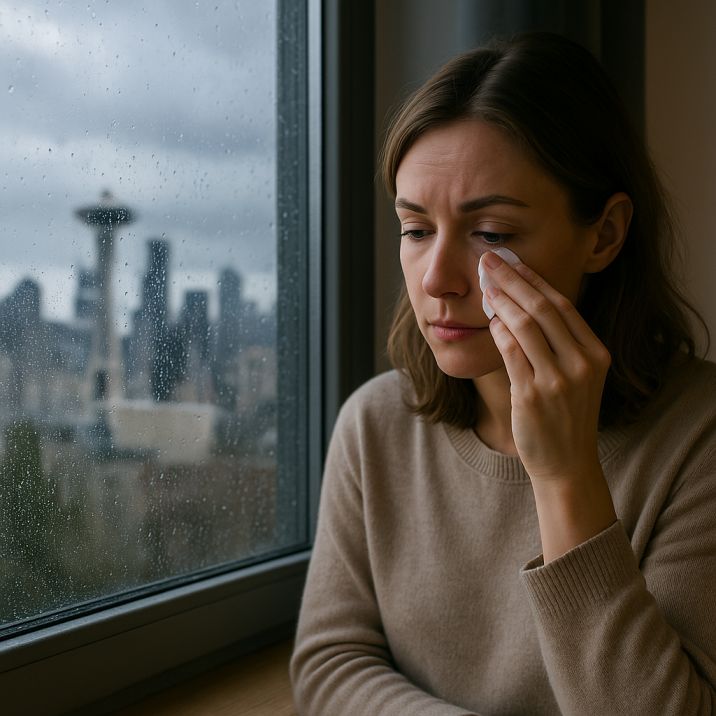Nutrition and Your Eyes
Seattle eye health starts in your kitchen.
Discover how the right local foods and nutrients protect vision, reduce strain, and keep your eyes sharp in the Pacific Northwest climate.
Key Takeaways
-
Nutrition is as vital as regular eye exams — targeted nutrients can cut macular degeneration risk by 25% and ease dry eye symptoms.
-
Seattle’s environment demands a tailored diet — limited sunlight, high screen use, and seasonal dryness require specific nutrient strategies.
-
Focus on the “Eye Health 8” — lutein, zeaxanthin, omega-3s, vitamins A, C, E, zinc, anthocyanins, and beta-carotene form your vision’s defense system.
-
Local sourcing boosts results — Pike Place, PCC, and farmers’ markets provide fresh, high-quality nutrients that absorb better than many supplements.
-
Age-specific nutrition works best — from kids shielding against screen glare to adults preventing AMD, needs evolve across life stages.
-
Timing matters — eat antioxidant-rich foods before long screen sessions and omega-3-rich meals during dry heating seasons.
-
Supplements can fill gaps — choose USP-verified, third-party tested options when diet alone can’t meet needs.
-
Consistent habits drive long-term results — weekly nutrition goals, seasonal eating, and meal prep ensure year-round eye protection.
Why Your Fork Matters as Much as Your Eye Doctor
If you’re reading this on a screen in Seattle’s gray morning light, your eyes face unique challenges. Between the Pacific Northwest’s limited sunlight and our tech-driven lifestyles, protecting your vision requires more than just corrective lenses.
Research reveals a critical connection: The foods on your plate can reduce your risk of age-related macular degeneration (AMD) by 25% and dramatically improve dry eye symptoms – conditions our Seattle clinic treats daily. At Cannon EyeCare, we’ve seen how targeted nutrition complements clinical eye care.
This Seattle-specific guide delivers:
-
Science-backed eating strategies for PNW lifestyles
-
Local ingredient sourcing (Pike Place Market, PCC, Whole Foods)
-
Practical meal plans for tech workers, outdoor enthusiasts, and families
-
Prevention-focused tips for Seattle’s top vision threats
The Science Behind Food and Vision
How Nutrients Protect Seattle Eyes
Seattle’s environmental challenges – shifting from mountain hikes to screen-lit offices – generate oxidative stress that damages delicate eye tissues. Specific nutrients form your eyes’ natural defense system:
-
Antioxidants: Neutralize free radicals from screens and UV exposure – critical for our tech-heavy lifestyles
-
Anti-inflammatories: Reduce tissue swelling – combats seasonal allergy irritation common in the PNW
-
Essential Fatty Acids: Maintain healthy tear film – fights indoor heating dryness during rainy months
-
Vitamins/Minerals: Support retinal function – addresses vitamin D deficits from limited sunlight
The Macular Pigment Connection
Your macula (central vision hub) contains lutein and zeaxanthin – nature’s blue-light filters that:
-
Act as internal sunglasses against harmful light
-
Shield delicate photoreceptors from damage
The 8 Essential Nutrients Your Seattle Eyes Need Daily
1. Lutein & Zeaxanthin: Nature’s Blue-Light Shield
Why Seattle needs these: Filters blue light from screens and overcast skies while cutting macular degeneration risk by 40%.
-
Daily: Lutein (10-20mg) + Zeaxanthin (2-4mg)
-
Local Sources:
-
Kale/spinach at Pike Place Market
-
Washington-grown corn, peas, Brussels sprouts
-
Free-range eggs (Skagit River Ranch)
-
-
Seattle Pro Tip: Pair with Wild Salmon fat for 300% better absorption.
2. Omega-3s: Combat Seattle’s Dry Eye Crisis
Targets office AC dryness and seasonal weather swings: Reduces inflammation, boosts tear quality.
-
Daily: EPA (1,000-2,000mg) + DHA (500-1,000mg)
-
Local Sources:
-
Puget Sound wild salmon
-
Halibut/cod (Ballard Seafood)
-
PCC Community Markets flax/chia seeds
-
-
Seattle Advantage: Our seafood offers 2x better absorption than supplements.
3. Vitamin A: Seattle’s Low-Light Vision Hero
Critical for dark winters and screen-lit commutes: Maintains night vision and light adaptation.
-
Daily: Men (900 mcg) | Women (700 mcg)
-
Local Sources:
-
Washington sweet potatoes
-
Carnation Farms carrots
-
Vitamin-A fortified Smith Brothers dairy
-
4. Vitamin C: PNW’s Antioxidant Powerhouse
Counters screen radiation and seasonal allergies: Protects lenses, supports blood vessels.
-
Daily: Men (90mg) | Women (75mg)
-
Seasonal Seattle Picks:
-
Summer: U-pick Skagit Valley berries
-
Fall: Wenatchee apples
-
Year-round: Columbia Valley bell peppers
-
5. Vitamin E: Oxidative Damage Defender
Teams with Vitamin C against Seattle’s urban pollution: Shield cell membranes.
-
Daily: 15mg
-
Local Sources:
-
Washington-grown hazelnuts
-
Oberto’s pumpkin seeds
-
Sunflower oil (Fairhaven Mills)
-
6. Zinc: Vision’s Nutrient Transporter
Essential for vitamin A delivery – prevents “Seattle night blindness”:
-
Daily: Men (11mg) | Women (8mg)
-
Local Sources:
-
Taylor Shellfish oysters
-
Thundering Hooves grass-fed beef
-
Stokesberry pumpkin seeds
-
7. Anthocyanins: Winter Night Vision Boosters
Enhances retinal blood flow during dark months:
-
Top Seattle Sources:
-
Frozen Washington blueberries
-
Lakewood blackberries
-
Yakima Valley cherries (summer stockpile)
-
8. Beta-Carotene: Smart Vitamin A Regulator
Converts to Vitamin A without overdose risk – ideal for supplement-wary Seattleites:
-
Local Sources:
-
Carnival squash (local farm stands)
-
Washington carrots
-
Bailey Farms pumpkins
-
Age-Specific Eye Nutrition at Cannon EyeCare (Seattle)
Children & Teens (5-18): Building Vision Resilience
Unique Seattle Challenges:
-
Rainy-day screen marathons
-
Limited winter daylight for outdoor play
-
School digital eye strain (Chromebook-heavy classrooms)
Nutritional Priorities:
-
Omega-3s: Retinal development (1,000mg EPA/DHA daily)
-
Lutein: Shields against blue light from devices
-
Vitamin A: Supports night vision for dark commutes
Seattle Family Meals:
-
Salmon “Fish Sticks” (Wild Pacific cod + Panko crumbs from Uwajimaya)
-
Kale-Apple Smoothies (PCC frozen greens + Jones Creek Farms apples)
-
Veggie Egg Scrambles (Stokesberry Sustainable eggs + seasonal farmers market veggies)
Adults (19-50): Fueling Seattle’s Hustle
Lifestyle Factors:
-
10+ hr screen days (tech jobs in SLU/Bellevue)
-
Light-shifting commutes (I-5 tunnels to glaring bridges)
-
Weekend outdoor adventures (hiking/cycling)
Nutritional Focus:
-
Antioxidant Bombs: Combat digital eye strain
-
Anti-inflammatories: Reduce work fatigue
-
Nutrient Timing: Align meals with screen exposure
Meal Prep for Professionals:
-
Salmon Salad Jars (Pike Place smoked salmon + Local Roots greens)
-
Berry-Nut Overnight Oats (Bob’s Red Mill oats + Sosio’s berries)
-
Hummus Veggie Packs (**Ellenos hummus + Alm Hill veggies)
Older Adults (50+): Protecting Against PNW Aging
Seattle-Specific Risks:
-
Higher AMD prevalence than the national average
-
Medication-nutrient conflicts (e.g., blood thinners + vitamin K)
-
SAD-induced nutritional gaps during “The Big Dark”
Critical Nutrients:
-
AREDS2 Formula: Lutein (10mg) + Zeaxanthin (2mg) + Zinc (25mg)
-
Omega-3s (2,000mg EPA/DHA): Battles heating-induced dry eyes
-
Vitamin D3 (2,000 IU): Compensates for sunless winters
Seasonal Eating for Year-Round Eye Health in Seattle
Align your plate with Seattle’s harvest calendar for optimal vision protection:
-
Spring (Mar-May):
-
Asparagus & peas → Lutein boost (Pike Place’s Frank’s Produce)
-
Early strawberries → Anthocyanins (U-pick Snohomish farms)
-
Free-range eggs → Zeaxanthin (Skagit River Ranch)
-
-
Summer (Jun-Aug):
-
Peak berries → Max antioxidants (Snoqualmie Valley u-pick)
-
Fresh corn → Zeaxanthin (Carnation Farms)
-
Market greens → Daily lutein (Columbia City Farmers Market)
-
-
Fall (Sep-Nov):
-
Squash/pumpkins → Beta-carotene (Fall City farms)
-
Apples → Vitamin C repair (Wenatchee orchards)
-
Hazelnuts → Vitamin E shield (Freddy Guys Hazelnuts)
-
-
Winter (Dec-Feb):
-
Root vegetables → Sustained vitamin A (Alm Hill Farms)
-
WA citrus → Immune-boosting C (Eastern WA groves)
-
Frozen berries → Year-round anthocyanins (Snoqualmie Ice Co.)
-
Seattle’s Best Eye-Health Markets
Where to shop for vision-protecting foods:
Pike Place Market Essentials:
-
Pure Food Fish: Wild salmon (Omega-3s)
-
Frank’s Quality Produce: Seasonal lutein greens
-
Pike Place Fish Guys: Zinc-rich oysters
Top Farmers Markets:
-
University District (Sat):
-
Stokesberry Sustainable eggs
-
Alvarez Organic berries
-
-
Ballard (Sun):
-
Sea Breeze Farm dairy (Vitamin A)
-
Foraged vitamin D mushrooms
-
-
West Seattle (Sun):
-
Local Roots microgreens (Lutein)
-
Rockridge Orchards cider (Vitamin C)
-
Addressing Common Seattle Eye Health Challenges
1. Digital Eye Strain in Tech City
*With 73% of Seattleites working screen-heavy jobs*, combat eye fatigue with:
-
Immediate Relief Foods:
-
Washington blueberries before morning stand-ups
-
Smith Teamaker green tea for 2 pm crashes
-
Theo’s 85% dark chocolate (flavonoid boost)
-
-
Long-Term Protection Protocol:
-
Daily Wild Alaskan salmon oil (2,000mg omega-3)
-
Lutein/zeaxanthin supplements (from Cannon EyeCare)
-
Antioxidant snacks: Almonds + Oberto’s pumpkin seeds
-
2. Dry Eyes from Indoor Heating
*Seattle’s 7-month heating season demands proactive care*:
-
Nutritional Defense:
-
↑ Omega-3s to 2,000mg (try PCC’s Arctic cod oil)
-
Hydration protocol: 8-10 glasses of filtered Seattle water daily
-
Healthy fats at every meal:
-
Breakfast: Stokesberry eggs
-
Lunch: Olivar avocado drizzle
-
Dinner: Ballard Oil Co. olive oil roast veggies
-
-
3. Vitamin D Deficiency in Gray Winters
Our <60 annual sunny days require smart solutions:
-
Dietary Strategies:
-
Fortified foods: Smith Brothers milk + Franz Bakery D-bread
-
Fatty fish 3x/week: Pure Food Fish salmon/cod
-
Supplement smart:
“Consult Cannon EyeCare for personalized D3 dosing – most Seattle patients need 2,000-5,000 IU daily from Oct-May”
-
Professional Eye Care Integration
When Seattle Residents Should Consult Cannon EyeCare
While nutrition is foundational, professional care is essential for complete eye health. Schedule comprehensive exams at our Seattle clinic if:
-
You’re over 40 (annual exams recommended)
-
You have a family history of eye disease
-
Vision changes persist despite nutritional improvements
-
You work in Seattle’s tech sector with high screen exposure
Personalized Nutrition Consultations in Seattle
Our registered dietitians create custom eye nutrition plans based on your:
-
Current retinal and corneal health status
-
Seattle lifestyle factors (commute patterns, work demands)
-
Dietary preferences (vegan, gluten-free, etc.)
-
Pre-existing conditions (diabetes, hypertension)
Evidence-Based Supplement Guidance
Supplements may be necessary when:
-
Blood tests reveal nutrient deficiencies
-
Dietary restrictions limit key nutrient intake
-
Genetic testing shows high AMD/glaucoma risk
-
Food alone can’t meet requirements
Quality Assurance Protocol:
- Third-party tested supplements only
- USP-verified formulations
- Bioavailable forms for optimal absorption
- Medication conflict screening (e.g., blood thinners)
30-Day Seattle Eye Nutrition Challenge by Cannon EyeCare
Week 1: Foundation Building
-
Add daily dark greens:
-
Seattle Sourcing: Columbia City Farmers Market kale
-
-
2x Omega-3 meals:
-
Local Picks: Ballard Seafood salmon, canned Pike Place sardines
-
-
Berry/nut swaps:
-
Replace chips with Snoqualmie Valley frozen blueberries
-
-
Hydration tracking:
-
Carry a Seattle-themed water bottle (8 glasses filtered tap)
-
Week 2: Antioxidant Boost
-
Colorful plates:
-
Aim for 3+ colors/meal (Frank’s Produce rainbow veggies)
-
-
Market adventure:
-
Visit the University District Farmers Market for seasonal picks
-
-
Whole grain switch:
-
Replace white rice with Lundberg Farms quinoa
-
-
New recipe:
-
Try “Salmon-Stuffed Bell Peppers” (recipe at Cannon EyeCare blog)
-
Week 3: Advanced Optimization
-
Nutrient-first meals:
-
Build around eye nutrients vs. calories (e.g., lutein-packed frittatas)
-
-
Strategic timing:
-
Eat berries before screen-heavy work blocks
-
-
Plant proteins:
-
Try Frankie & Jo’s nut cheeses or Field Roast sausages
-
-
Symptom journal:
-
Note changes in screen comfort/light adaptation
-
Week 4: Lifestyle Integration
-
Seattle meal prep:
-
Sunday batch-cook Olympia Provisions stews with root veggies
-
-
Consistent rhythms:
-
Eat at 7 am/12 pm/6 pm to stabilize nutrient absorption
-
-
Seasonal transition prep:
-
Stock frozen Snoqualmie berries for gray months
-
-
Progress check:
“Schedule post-challenge exam at our South Lake Union or Bellevue clinic.“
Your vision is one of your most valuable assets, and the foods you choose daily can play a major role in protecting it. From antioxidant-rich produce to omega-3-packed seafood, Seattle offers everything you need to support long-term eye health. Small, consistent choices today can help you enjoy clear, comfortable vision for years to come.
Ready to take the next step toward healthier eyes? Schedule a comprehensive eye exam at Cannon EyeCare in Seattle. Our experts will assess your vision, offer personalized nutrition guidance, and help you build a plan for lifelong eye wellness. Book online or call today to protect your sight.
FAQs
-
Dark leafy greens (spinach, kale), fatty fish (salmon, mackerel), eggs, carrots, and berries. These contain lutein, zeaxanthin, omega-3s, and vitamin A for optimal vision support.




